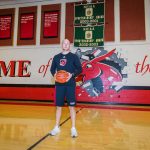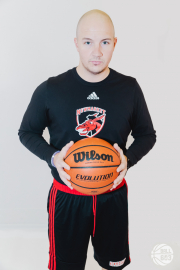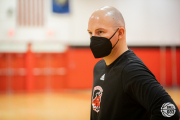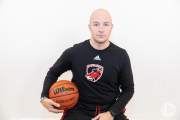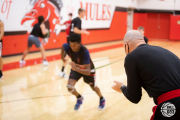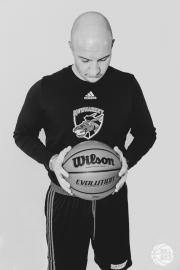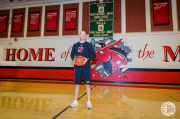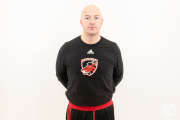By: Shane Covey
 Paul Revere rode to Portsmouth in 1774 to warn that the British Royal Navy was coming to capture the port. It seems as though residents of this coastal New Hampshire town have been well prepared ever since, no matter what uniforms they’re wearing.
Paul Revere rode to Portsmouth in 1774 to warn that the British Royal Navy was coming to capture the port. It seems as though residents of this coastal New Hampshire town have been well prepared ever since, no matter what uniforms they’re wearing.
When John Mulvey’s Portsmouth boys don the Maroon and Vegas Gold to take the floor, the Clippers are one of the most prepared teams in the state.
“Film watching and scouting are a massive part of what we do. After each one of our games, I clip up the film and we watch it. Film is the best learning tool, in my opinion, and we use it to our advantage,” said Mulvey. “Day before games, we watch film and clips of the team we will be playing the next day. I give out scouting reports with stats and tendencies of the opposing team and players. We watch a ton of film.”
The 15-3 Clippers, who are seeking their 23rd state championship, are seeded second in the upcoming Division 1 Tournament. They will host No. 15 Salem (7-11) in the opening round on Wednesday at 6 p.m.
“The D-1 tourney is wide open. Every night in our division, there are scores you may not have expected going into the night. There are so many teams capable of beating anyone. Expect the unexpected every night,” noted Mulvey.
Seven different teams have at least 13 wins, including top-ranked Bedford (15-3), Portsmouth, Trinity (14-4), Nashua South (14-4), Exeter (14-4), Keene (13-5) and Alvirne (13-5).
“It should be a fun tournament and we are looking forward to it,” the Clippers’ coach said.
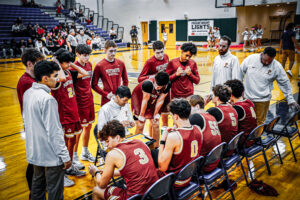
Prior to being in charge of the team, Mulvey scored a program-record 1,299 points and also helped Portsmouth win it all in 2009.
“When playing, I was focused on my role and what I needed to do on the court. I also took responsibility to try to know the game plan and scouting report really well,” he stated. “As a coach, I can’t impact the game the same way I could as a player. I try to put our guys in the best position to succeed and am lucky we have great players. I focus on more things like what sets to run, how to defend certain actions, and substitution patterns.”
He likely learned that from his dad, who guided the Clippers to five titles during his coaching career from 2006 to 2018.
When asked about the scouting report for his own squad, Mulvey mentioned that talent and size are both strengths. He added that his team likes to get the ball inside and is very good at rebounding.
“The defense is very similar to what my dad ran: man-to-man with a strong help side and trying to keep the ball out of the middle,” the coach said, noting that he has added drive and kick action to an offense that is averaging nearly 70 points per contest.
Portsmouth’s starting five consists of floor general Isaiah Reis, shooting guard Derek Swartz, forward Ryan Swartz, forward Anthony Ferola, and forward Zavier Lampert. Finn McCauley is the team’s super sub.
“We have a great group of guys that I am beyond fortunate to coach. The kids love to play basketball and they work hard each and every day to improve,” explained Mulvey.
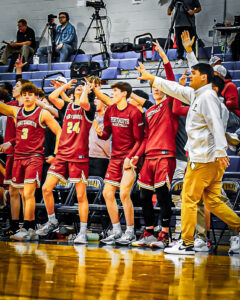
Reis is averaging 21 points and five assists a game, Derek Swartz is contributing 17 points and nearly 10 rebounds a night as a freshman, and Ryan Swartz chips in 10 points and nine boards per outing. Ferola brings energy and passion, while Lampert has a high IQ.
“Finn has been a force for us defensively and on the glass,” the coach said of his 6-6 freshman. “His size and length affect the game in so many ways for us.”
Mulvey, who likely would have had a scouting report on each Redcoat that Revere warned was coming (if he had been around during the Revolutionary era), will certainly have his troops ready for Salem on March 5.
“I am so grateful to be able to be the coach of Portsmouth High School – the school where my dad, cousin and brother all played before me. My dad and uncle both coached there,” he said. “It is truly an honor to be the head coach… something I do not take lightly. Portsmouth basketball is in my blood and I care deeply about the school, the community and the program.”



























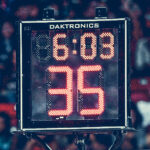
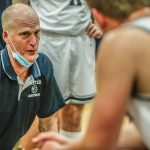
 EXETER – Jeff Holmes’ enthusiasm for basketball, which spans 50-plus years, shows no signs of diminishing.
EXETER – Jeff Holmes’ enthusiasm for basketball, which spans 50-plus years, shows no signs of diminishing.


 Jeff accepted a scholarship to Boston University, but never played under Pitino. On the eve of the season, the coach took a position as an assistant with the New York Knicks – a season that Jeff ended up spending on the BU bench.
Jeff accepted a scholarship to Boston University, but never played under Pitino. On the eve of the season, the coach took a position as an assistant with the New York Knicks – a season that Jeff ended up spending on the BU bench. It was a great experience. It’s where he met his wife, Janel.
It was a great experience. It’s where he met his wife, Janel. From Ball he learned how to run a program, including how to increase your participation numbers. “I developed that over the years,” Holmes said. “We’ve got good numbers for freshman and JV. We have a lot of competition for spots.”
From Ball he learned how to run a program, including how to increase your participation numbers. “I developed that over the years,” Holmes said. “We’ve got good numbers for freshman and JV. We have a lot of competition for spots.” Although there was success the two years after that, there was also frustration because of the pandemic.
Although there was success the two years after that, there was also frustration because of the pandemic.

 “We purposely put our best defenders on him every day in practice, Janai Cruz or Alex Camire, and it doesn’t bother Thomas,” added Meade. “He’s very poised and has all the confidence in the world. I think his confidence is a factor of him playing so much basketball. He plays AAU in the offseason down in Mass. with some of the top players in Eastern Mass.”
“We purposely put our best defenders on him every day in practice, Janai Cruz or Alex Camire, and it doesn’t bother Thomas,” added Meade. “He’s very poised and has all the confidence in the world. I think his confidence is a factor of him playing so much basketball. He plays AAU in the offseason down in Mass. with some of the top players in Eastern Mass.”
